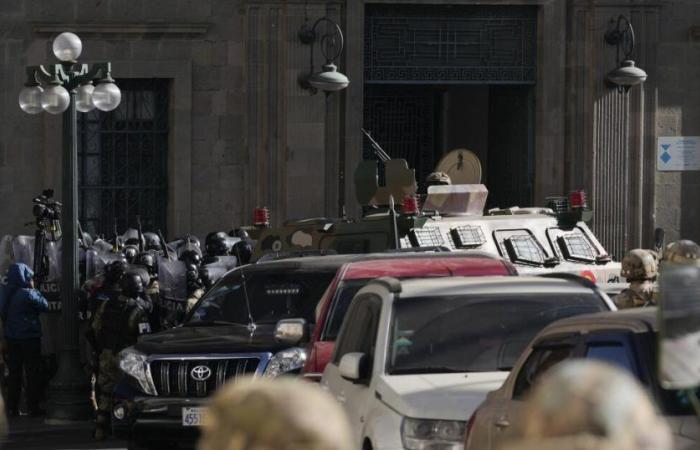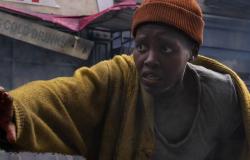Bolivia was shaken on Wednesday by a massive military mobilization in front of the government palace in what authorities described as an attempted coup, which kept the country in suspense for several hours until the general allegedly behind the Army deployment was arrested.
The Bolivian president, Luis Arce, called on the people to mobilize against the operation and appointed a new military leadership, which ordered the withdrawal of the troops and relieved the general commander of the Army, Juan José Zúñiga, protagonist of the mobilization of uniformed men against the government. .
“We cannot allow coup attempts to take the lives of Bolivians once again,” Arce emphasized in a national message broadcast on television.
After the change in military command, the uniformed men and military vehicles deployed in the square in front of the government headquarters left the place. So did Commander Zúñiga, who was later arrested after several hours of tension in the country.
The Minister of Government, Eduardo del Castillo, reported at the end of the afternoon that there were two arrested—Zúñiga and a former Navy commander—and two wounded, who were sent to the hospital. He only mentioned that one of them received a shotgun “pellet” in the leg.
“Without a doubt today has been an atypical day in the life of a country that wants democracy,” declared President Arce. And he referred to “an attempted coup d’état by the military who are staining the uniform, who are attacking our Constitution.”
“We deplore the attitudes of bad soldiers who unfortunately repeat history by trying to carry out a coup d’état when the Bolivian people have always been democratic people,” he stressed. Shortly afterward he came out to greet from the government palace surrounded by his ministers and thanked a crowd of Bolivians who came to the square.
Hours later, the dismissed General Zúñiga was arrested by the police following an order from the Attorney General’s Office. The Vice Minister of the Interior Regime, Jhonny Aguilera, informed journalists before the arrest that the soldier “has led a criminal attack that has put the country on edge. The Public Ministry has already ordered an investigation” and mentioned that he is accused of several crimes that he did not detail.
Before being arrested and in a brief dialogue with journalists, Zúñiga said that President Arce had asked him to mobilize troops to raise his image. “The president told me ‘the situation is very screwed up, very critical, it is necessary to prepare something to raise my popularity.’ Shall we take out the armored vehicles?” he asked Arce and the president, according to the military man, responded, “take out.”
The Bolivian president did not immediately respond to the accusations. The AP asked the Minister of the Presidency, María Nela Prada, for comment, but did not receive a response.
The Government Minister blamed Zúñiga for an attempted coup with political motivations. “We have two learned. What was the goal of this group? The objective was to overthrow the democratically elected authority,” he indicated in a public message where he presented the two detainees, among them, the military command. “There were political motivations; General Zúñiga wanted to take command,” said Eduardo del Castillo.
The other detainee presented to the media was Vice Admiral Juan Arnez Salvador, general commander of the Bolivian Navy who was also relieved of his position on Monday.
Edmundo Novillo, the Minister of Defense, appeared shortly afterwards surrounded by the new military commanders to assure that “everything is now under control” and that the “coup attempt has been put down, it has been a failed coup.” He called on citizens to return to normality.
And he added that “the barracks are returning to normal.”
“This has been a setup, he (Zúñiga) fulfilled the script that he was told to make, it has already begun to be dismantled. There was a lot of disbelief, they wanted to give him a greater narrative with the live arrest and he says that he has only done what they told me to do,” said Carlos Romero, former government minister of Evo Morales to the Red Uno television station.
Morales had already denounced on X, previously on Twitter, that a coup d’état was in the works.
Television images showed several armored military vehicles and a group of soldiers in front of the government headquarters, who later entered the palace, after ramming and forcing entry.
Army commander Zúñiga, present in the same Plaza Murillo, said: “We are upset by the outrage that exists, enough is enough.” Without giving more details of what he was referring to, he spoke on television about “attacks on democracy”, that “there will soon be a change of cabinet” and that “for now” he recognized President Arce as commander in chief of the Armed Forces.
Arce was later seen confronting Zúñiga, whom the president appointed to the position in November 2022, in the palace hallway. “I am his captain and I order him to withdraw his soldiers and I will not allow this insubordination,” he emphasized.
The military command justified the deployment because “an elite has taken over power, the State.” He said, in the midst of tension, that the Armed Forces want to restructure democracy and asked for the freedom of all political prisoners, mentioning former interim president Jeanine Áñez and Luis Fernando Camacho, governor of the rich province of Santa Cruz, both in prison. .
“It cannot be that subordinates are imprisoned for having followed orders,” in relation to the trial and convictions against military leaders who participated in the 2019 political crisis that led to the resignation of then-President Morales (2006-2019).
“The army does not lack balls to look after the tomorrow of our children,” the military command stressed about the fatigue of those in uniform with the decisions of the political class. The promotion lists in the Army are still pending approval by the Legislature due to internal struggles between the sectors of the ruling party and lack of majority.
The day before, Commander Zúñiga said in a televised interview that if former president Morales maintained his intentions to run for president again, they could arrest him.
The new military command appointed by Arce to replace Zúñiga, José Wilson Sánchez, rejected what happened. “They said it is a special situation because no one wants to see the image we are seeing in the streets,” he declared and ordered the withdrawal of the troops that had been mobilized.
Supporters of the president gathered in the square and shouted slogans in his favor such as “I fight, you are not alone” or “Rifle, shrapnel, the people do not shut up.” The military fired tear gas to disperse them.
The Central Obrera Boliviana (COB), the main union, declared a general strike and called for workers to “mobilize.”
The attempted coup in Bolivia generated reactions of rejection throughout the region. The presidents of Brazil, Mexico, Chile, Venezuela, Paraguay and Argentina, among others, sent messages of support to Bolivia and condemned what happened.
The General Secretariat of the Organization of American States (OAS) condemned what happened and appealed for the Army to submit “to the legitimately elected civil power.”
Luis Almagro, Secretary General of the OAS, spoke from Asunción and rejected the situation: “The international community, the OAS and the General Secretariat of the OAS will not tolerate any form of violation of the legitimate constitutional order in Bolivia, or anywhere else.”






